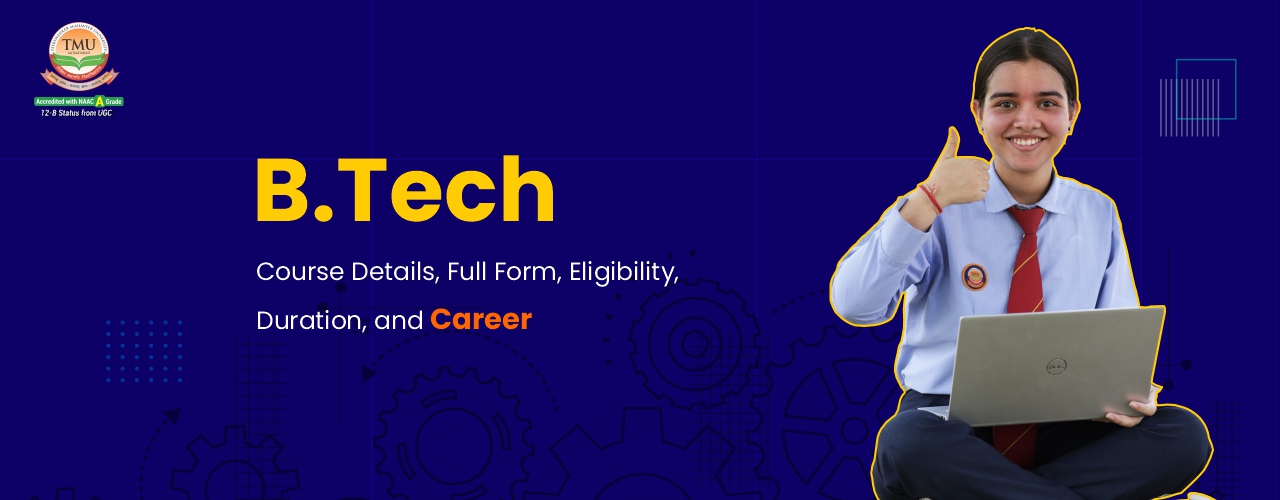Complete Guide to B.Tech Course: Eligibility, Duration, and Career Options
Table of Contents
A B.Tech course is a four-year undergraduate-level engineering degree program, divided into 8 semesters. It is a professional degree that provides knowledge and training in the field of technology and engineering. Some of the common and available specialisations are Computer Science, Mechanical, Civil, Electrical, Electronics and Communication, Biotechnology and Artificial Intelligence.
The curriculum program is usually based on classroom, practical training, internship, and project-based training, which prepares students to work in technology, data science, and engineering careers. The duration of this course is 4 years. Universities grant admission to this course through national or state-level entrance exams like JEE Main.
Full Form of B.Tech
B.Tech stands for Bachelor of Technology, a four-year undergraduate degree program. The course provides numerous specialisations to students in the field of technology. After pursuing this course, students get a wide range of opportunities in various sectors like information technology, manufacturing, artificial intelligence, and data science.
Teerthanker Mahaveer University
Apply for Admission
Click Here To Apply for Admission
B.Tech Course Overview
| Particulars | Details |
| Course Name | B.Tech (Bachelor of Technology) |
| Level | Undergraduate |
| Duration | 4 Years (8 Semesters) |
| Eligibility | 10+2 with PCM, min. 50% aggregate |
| Admission | Entrance Exam / Merit / Direct |
| Entrance Exams | JEE Main, JEE Advanced, UPSEE, WBJEE, MHT CET, University Exams |
| Specialisations | CS, Mechanical, Civil, ECE, IT, AI & Data Science |
B.Tech Course Specialisations
| Stream / Branch | Focus Area |
| Computer Science Engineering (CSE) | Software development, AI, ML, Data Science, Cybersecurity |
| Information Technology (IT) | Networking, Web Development, Cloud Computing, Database Management |
| Electronics & Communication Engineering (ECE) | Embedded systems, Communication Networks, VLSI, IoT |
| Mechanical Engineering | Design, Manufacturing, Robotics, Thermal Systems |
| Civil Engineering | Construction, Structural Design, Urban Planning, Infrastructure |
| Electrical Engineering | Power Systems, Electrical Machines, Renewable Energy |
| Chemical Engineering | Process Design, Chemical Reactions, Pharmaceuticals, Petrochemicals |
| Artificial Intelligence & Data Science (AI & DS) | Machine Learning, Data Analytics, Neural Networks |
| Biotechnology / Biomedical Engineering | Genetics, Medical Devices, Pharmaceuticals |
| Aerospace / Aeronautical Engineering | Aircraft Design, Space Systems, Propulsion |
B.Tech Course Eligibility Criteria
To pursue a B. Tech course, you must meet the following eligibility criteria:
- To be eligible for the B.Tech course, you must complete Class 12 (or equivalent) with Physics, Chemistry, and Mathematics.
- The minimum marks should be at least 50% aggregate in PCM.
- You must have qualified for the entrance exam, JEE Main, and JEE Advanced.
- Engineering diploma holders may also be eligible to apply.
B.Tech Course Fees in India
| Type of Institute | Annual Tuition Fees (Approx.) | Total Fees for 4-Year B.Tech (Tuition Only) |
| Government / Public Colleges | ₹ 50,000 – ₹ 2,00,000 per year (Select Your University) | ~₹ 2,00,000 – ₹ 8,00,000 (CourseFees) |
| Private Colleges (Tier-1, high reputation) | ₹ 1,50,000 – ₹ 4,00,000 (sometimes more) per year | ~₹ 6,00,000 – ₹ 16,00,000+ (Formfees) |
| Very Expensive Private / Deemed Universities | Can be above ₹ 4,00,000/year depending on specialisations and amenities | Can go beyond ₹ 16,00,000–₹ 20,00,000 for the full course with all charges |
B.Tech Subjects
B.Tech (Bachelor of Technology) curriculum varies significantly by specialisation. Here is a well-structured list of B.Tec subjects:
Common B.Tech Subjects (All Branches - First Year)
| Semester | Core Subjects |
| Semester 1-2 | Engineering Mathematics, Physics, Chemistry, Basic Electrical Engineering, Engineering Mechanics, Computer Programming, Engineering Graphics, Environmental Studies, Communication Skills, Workshop Practice |
Core Subjects by Specialisation
| Specialisation | Key Subjects |
| Computer Science Engineering (CSE) | Data Structures & Algorithms, Operating Systems, Database Management Systems (DBMS), Computer Networks, Software Engineering, Artificial Intelligence, Machine Learning, Cybersecurity |
| Information Technology (IT) | Web Technologies, Cloud Computing, Mobile App Development, Big Data Analytics, Software Project Management |
| Electronics & Communication (ECE) | Digital Electronics, Analogue Circuits, Microprocessors, Communication Systems, VLSI Design, Embedded Systems, Internet of Things (IoT) |
| Mechanical Engineering | Thermodynamics, Fluid Mechanics, Machine Design, Manufacturing Processes, Robotics, CAD/CAM |
| Civil Engineering | Structural Engineering, Geotechnical Engineering, Surveying, Construction Materials, Environmental Engineering, Transportation Engineering |
| Electrical Engineering | Circuit Theory, Electrical Machines, Power Systems, Control Systems, Renewable Energy Systems |
| AI & Data Science | Artificial Intelligence, Deep Learning, Data Mining, Natural Language Processing (NLP), Data Visualisation |
| Chemical Engineering | Chemical Reaction Engineering, Process Dynamics & Control, Mass Transfer, Heat Transfer, Industrial Safety |
| Biotechnology | Genetic Engineering, Molecular Biology, Bioprocess Engineering, Bioinformatics |
Career Opportunities After B.Tech
| Field | Job Roles | Industries |
| Computer Science / IT | Software Developer, Web/App Developer, Data Scientist, Cybersecurity Analyst, Cloud Engineer | IT Companies, Startups, FinTech, E-commerce |
| Electronics / Electrical | Embedded Systems Engineer, VLSI Engineer, Electrical Design Engineer, Automation Engineer | Electronics, Telecom, Power Plants, Manufacturing |
| Mechanical | Design Engineer, Production Engineer, Quality Control Engineer, Maintenance Engineer | Automotive, Manufacturing, Aerospace |
| Civil | Site Engineer, Structural Engineer, Planning Engineer, Project Manager | Construction, Infrastructure, Real Estate |
| Chemical / Biotech | Process Engineer, R&D Scientist, Production Chemist | Pharma, Petrochemical, Food Processing |
Average Salary After BTech (By Sector)
| Sector / Career Path | Job Roles | Average Starting Salary (INR per annum) | Experienced Salary (5+ years) |
| Information Technology (IT) & Software | Software Developer, Web/App Developer, Data Analyst, AI Engineer | ₹4 – ₹8 LPA | ₹10 – ₹30 LPA+ |
| Core Engineering (Mechanical, Civil, Electrical, Electronics) | Design Engineer, Site Engineer, Maintenance Engineer, Embedded Engineer | ₹3 – ₹6 LPA | ₹8 – ₹20 LPA |
| Public Sector Undertakings (PSUs) | Graduate Engineer Trainee (GET), Scientist, Technical Officer | ₹6 – ₹12 LPA | ₹15 – ₹25 LPA |
| Consulting & Management | Business Analyst, Product Manager, Project Consultant | ₹5 – ₹10 LPA | ₹15 – ₹35 LPA+ |
| Data Science & AI/ML | Data Scientist, Machine Learning Engineer, AI Specialist | ₹6 – ₹12 LPA | ₹15 – ₹40 LPA+ |
| Cybersecurity & Cloud Computing | Cybersecurity Analyst, Cloud Engineer, DevOps Engineer | ₹5 – ₹10 LPA | ₹12 – ₹35 LPA |
| Construction & Infrastructure | Project Engineer, Planning Engineer, Civil Site Manager | ₹3 – ₹6 LPA | ₹8 – ₹20 LPA |
| Research & Development (R&D) | Research Associate, R&D Engineer, Scientist | ₹4 – ₹8 LPA | ₹10 – ₹25 LPA |
| Higher Education / Teaching | Lecturer, Assistant Professor | ₹3 – ₹6 LPA | ₹8 – ₹15 LPA |
| Startups & Entrepreneurship | Founder, Co-founder, Product Developer | ₹0 – ₹10 LPA+ (varies widely) | ₹20 LPA+ (if successful) |
| Banking, Finance & Government Jobs | Probationary Officer, Technical Analyst, Civil Servant | ₹4 – ₹8 LPA | ₹10 – ₹25 LPA |
Skills Required for B.Tech Students
- They need skills in programming languages. They should also know software tools and engineering concepts. These should be relevant to their specialisation.
- Soft skills are crucial, encompassing communication, problem-solving, teamwork, leadership, and adaptability. These skills are essential. They are key to collaboration and fostering career growth.
Top B.Tech Colleges in UP
| College Name | Location | Key Highlights |
| Teerthanker Mahaveer University (TMU) | Moradabad | AICTE-approved, NBA-accredited B.Tech (CSE), 100% placement assistance, strong industry tie-ups, global exposure. |
| IIT Kanpur | Kanpur | Premier engineering institute in India with world-class faculty, research, and placements. |
| IIT (BHU) Varanasi | Varanasi | Legacy institution known for cutting-edge engineering programs and a strong alumni network. |
| Motilal Nehru National Institute of Technology (MNNIT) | Prayagraj | NIT-status college with excellent placement records and government support. |
| Aligarh Muslim University (AMU) | Aligarh | Reputed central university with quality engineering education and a strong R&D culture. |
| Rajiv Gandhi Institute of Petroleum Technology (RGIPT) | Amethi | Specialises in petroleum and energy engineering with top industry collaborations. |
| Amity University | Noida | Renowned private university with strong infrastructure, placements, and global exposure. |
Why Choose TMU for the B.Tech Course?
Teerthanker Mahaveer University is considered one of the best choices for students pursuing the B.Tech course. Pursuing your B.Tech in TMU will provide you with a fantastic combination of academic and industry-oriented programs coupled with state-of-the-art infrastructure.
TMU has cutting-edge laboratory facilities, intelligent classrooms, and research facilities with NAAC A accreditation. With the assistance of highly qualified and experienced faculty, students receive high-quality technical skills, hands-on experience and career-ready skills. TMU has excellent industry relations, placement services, and a well-rounded campus life, which elevate it to be the perfect university to establish an outstanding engineering career.
Conclusion
The most demanded undergraduate degree program is a B.Tech course because it provides specific technical knowledge, problem-solving skills and practice in the shape of laboratories, projects and internships. Having studied this course, students receive diverse opportunities in different fields such as information technology, manufacturing, artificial intelligence, and data science. The B.Tech course provides numerous employment opportunities to students who would like to work in the technology sector. B.Tech graduates tend to receive better pay.
FAQ
Q1. Which is the best B.Tech course to pursue?
Ans. There’s no particular best B. Tech course to pursue, it depends on your choice, interest and career goal. Whether you want to pursue your career in Civil Engineering, Electronics Engineering or Mechanical Engineering.
Q2. What is the B.Tech course?
Ans. A B.Tech course (Bachelor of Technology) is a four-year undergraduate degree program. The course is designed to prepare students for a career in Computer Science, Mechanical Engineering, and Electrical Engineering.
Q3. Can I do a B.Tech course after 12th?
Ans. Yes, you can do a B.Tech course after 12th. The core subjects should be Physics, Chemistry, and Mathematics.
Q4. Is the B.Tech course 3 years or 4 years?
Ans. B.Tech (Bachelor of Technology) is typically a four-year undergraduate degree program. The program is divided into eight semesters.















